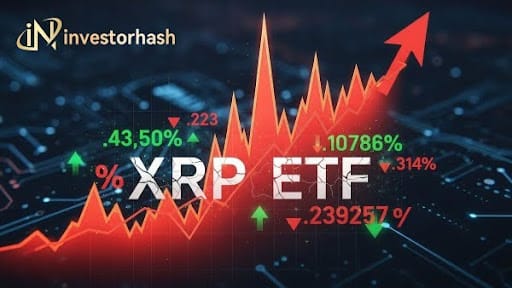South Korean Presidential Candidates Display Unified Support for Bitcoin ETFs

All three major South Korean presidential candidates have publicly expressed support for legalizing Bitcoin exchange-traded funds (ETFs) ahead of the June 3 election, according to CryptoQuant founder and CEO Ki Young Ju. Currently, both Bitcoin ETFs and institutional crypto investments are banned in South Korea, resulting in a market where "100% volume comes from retail" investors.
Democratic Party leader Lee Jae-myung has promised to legalize spot crypto ETFs, reduce transaction fees, and "create a safe investment environment so that young people can build assets and plan for the future," according to a report from The Korean Economic Daily. His campaign joins similar pledges from People Power Party candidate Kim Moon-soo and New Reform Party candidate Lee Jun-seok, marking the first presidential race where digital assets have taken center stage in policy proposals.
Historical Context and Market Potential
South Korea's current regulatory stance contrasts sharply with recent global developments in cryptocurrency investment products. While the United States approved spot Bitcoin ETFs in January 2024 and Hong Kong launched Asia's first spot Bitcoin ETFs in April 2024, South Korean investors remain limited to direct cryptocurrency purchases through exchanges.
The country's restrictive "one-exchange-one-bank" policy has further constrained market development by limiting cryptocurrency exchanges to working with only one bank for real-name verification, as noted by CoinTelegraph. Despite these limitations, South Korea has emerged as a significant crypto market with an estimated 16 million cryptocurrency investors, representing approximately 36% of eligible voters according to Analytics Insight.
"Economic sanctions imposed unilaterally by the West have catalyzed a rush towards a neutral currency outside the purview of any single nation-state," explains financial analyst Minjae Park from Seoul National University. "South Korea cannot afford to fall behind in this transformative shift."
Regulatory Developments and Policy Shifts
South Korea's cryptocurrency regulation has evolved significantly since 2021, when the Act on Reporting and Use of Specific Financial Transaction Information first extended Anti-Money Laundering requirements to virtual asset service providers. Most recently, the Act on the Protection of Virtual Asset Users came into force in July 2024, establishing stronger consumer protections and market oversight.
The Financial Services Commission (FSC) has announced plans to introduce a second phase of cryptocurrency legislation in the latter half of 2025, focusing on issuance, distribution, and stablecoin regulation, according to The Block. This upcoming framework aims to take "a comprehensive and systematic approach that encompasses service providers, crypto users and the crypto market," as stated by FSC Vice Chair Kim So-young.
The current administration's failure to follow through on previous promises to legalize spot crypto ETFs has become a central campaign issue. The ruling People Power Party came to power in 2022 with pledges to lift the ETF ban and revise the controversial one-exchange-one-bank rule but failed to implement these changes before President Yoon's impeachment.
Global Context and Competitive Positioning
South Korea's potential policy shift comes as neighboring countries actively develop their cryptocurrency markets. Hong Kong launched six spot Bitcoin and Ether ETFs in April 2024, becoming Asia's first jurisdiction to offer such products. While initial trading was relatively modest compared to U.S. equivalents, OSL Managing Director Ryan Miller expects "substantial growth" in Hong Kong's spot crypto ETF market in 2025, as reported by The Block.
"The significance of Hong Kong ETFs is far-reaching as it could bring in fresh global investment as well as pushing crypto adoption to a new height," said Antoni Trenchev, co-founder of crypto exchange Nexo, as quoted by CNBC.
According to the Global Bitcoin Policy Index (GBPI), South Korea currently ranks 13th among 35 countries evaluated for their Bitcoin regulatory frameworks, with a score of 69.0 out of 100. Leading nations like Switzerland, Singapore, and El Salvador have developed balanced regulatory approaches that address risks while enabling innovation, providing potential models for South Korea's future policy direction.
Implications for Investors and Market Structure
The approval of spot Bitcoin ETFs could transform South Korea's cryptocurrency landscape by introducing institutional capital into what is currently a retail-dominated market. This shift would likely increase market liquidity, reduce volatility, and potentially narrow the "Kimchi Premium"—the historically higher cryptocurrency prices in South Korea compared to global markets.
"Institutional entry could stabilize these volumes over time, reducing retail-driven price swings," notes Kim from Blockchain News. Market analysts project that the legalization of Bitcoin ETFs could attract significant capital from pension funds, insurance companies, and other institutional investors previously restricted from cryptocurrency exposure.
For individual investors, ETFs would provide a regulated alternative to direct cryptocurrency ownership, potentially reducing technological barriers to entry and security concerns associated with self-custody. This accessibility could further expand South Korea's already substantial cryptocurrency user base.
Related Reading on BTC Peers
Global Bitcoin Policy Index (GBPI)
This comprehensive assessment evaluates national regulatory frameworks for Bitcoin across 35 countries worldwide. Readers will gain valuable insights into how different nations balance innovation with consumer protection, with detailed rankings that place countries on a spectrum from restrictive to supportive. The index provides a data-driven framework for understanding the policy factors that enable cryptocurrency adoption while addressing legitimate regulatory concerns.




